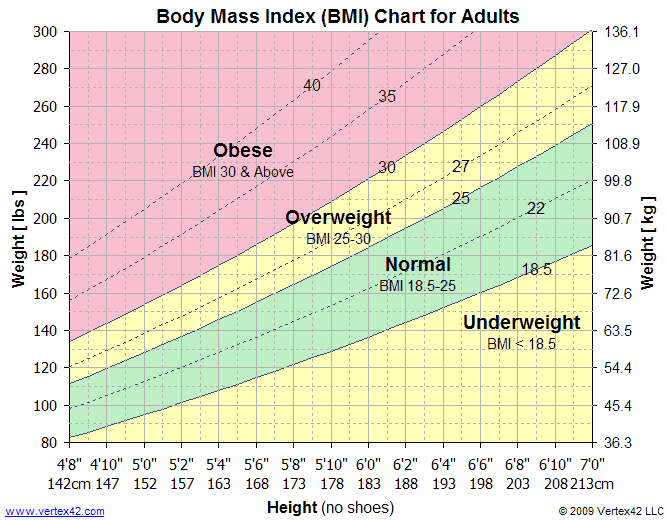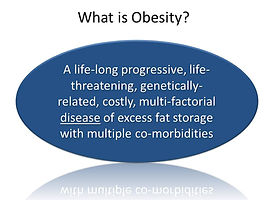Learn More about Obesity and Weight Loss Surgery
You have questions, so we have answers. Let us help you decide if bariatric surgery is right for you. Click on the links below to determine your BMI, eligibility for weight loss surgery, surgery comparisons and potential complications, and how obesity may be affecting you.
Body mass index (BMI) is measure of body fat based on height and weight. The higher the BMI, the greater the risk of some diseases, including high blood pressure, coronary artery disease, stroke, osteoarthritis, some cancers, and type 2 diabetes.
BMI Numbers - what do they mean?
•A BMI below 18.5 is considered underweight.
•A BMI between 18.5 and 24.9 is considered a healthy weight.
•A BMI between 25 and 29.9 is considered overweight.
•A BMI of 30 and above is considered obese.
There are many places to calculate your BMI including free apps, cards, wheels, and websites. The National Institute for Health (NIH) and the Center for Disease Control (CDC) have easy to use calculators you can use for free, and their sites offer a range of general information on using your BMI as a guide to overall health.
Adjustably Restrictive
A silicone band is placed
around the upper part of the stomach
A small pouch is created
Stomach holds less food
Induces feeling of satiety (i.e. loss of hunger)
Shorter OR time and stay
Return quickly to work
Evaluated every 6-8 weeks for gradual tightening if necessary
45% long term weight loss depending on stating BMI
Must be adjusted to work
Lose 2 lbs/week when adjusted well
15% failure to lose >30% of excess weight in first year
Risk of erosion or slippage are as low as 1-3%
Gastric Bypass (Roux-en-Y gastric Bypass):
-
Fixed Restriction and Malabsorption
-
Most frequently performed bariatric procedure in the US
-
Laparoscopically since 1993
-
Dumping effect to limit sweets
-
65% excess weight loss
-
Failure rate <5%
-
Most weight loss in first 6-8 months
-
Long term weight may fluctuate 10-20%
-
Success significantly affected by diet and exercise
-
Post-operative bleeding = 4-8%
-
Anastamotic strictures = 10-15%
-
Marginal Ulceration = 2-5%
-
Internal Herniation = 1-5%
-
Protein, Mineral, Vitamin Malabsorption, Vitamins A, K, E, D, B12, Folate, Calcium, Iron
Watch a totally robotic, laparoscopic small pouch gastric bypass being performed by Dr. Snyder, broken down into three major steps with narration and description!
Click HERE!
-
Very Restrictive
-
Non-adjustable
-
Lower morbidity/mortality than bypass
-
Allows conversion to other surgery
-
Keeps options open for high BMI patients or high risk patients
-
Weight loss at 3 years similar to RYGB
-
Long term results are promising
-
May not be as effective as gastric bypass in alleviating type II diabetes
Biliopancreatic Diversion with
-
Fixed malabsorptive
-
Developed 1979
-
Highest amount of weight loss
-
Severe risk of nutrient malabsorption- deficiencies
-
85% excess weight loss
-
Higher complication and mortality rate (1% - 2%)
The NIH (National Institute of Health) set up guidelines for determining eligibility for surgery based on the criteria set in 1991 (view full document).
They are as follows:
1.A body mass index (BMI) of at least 40 and are approximately 100 pounds over ideal body weight. Click HERE to use a BMI Calculator.
2.A BMI of 35 to 39.9 (obesity), and two serious weight related health problems such as diabetes or high blood pressure.
3.Age 18 or older.
4.No psycho-emotional or medical problems that would increase risk; no drug or alcohol dependency.
5.Smoking and chewing tobacco cessation. These behaviors increase risk for respiratory complications and stomach ulcers, as well as other health problems.
6.Good molar teeth for chewing.
All patients will undergo nutritional and psychological evaluations before surgery. This is to determine if there is proper risk comprehension of the surgery, rule out eating disorders that should be addressed before surgery, and to make sure patients are aware of the changes in their diet that will have to be made. Want to know more about the changes in diet? Click HERE for general inofrmation and visit Carol's Corner!
"It is a disease, just like high blood pressure or cancer is," Dr. Snyder says all the time. "That's what I do, I treat disease."
Obesity is a life-long progressive, life-threatening, genetically-related, costly, multi-factorial disease of excess fat storage with multiple co-morbidities. Clinically severe obesity occurs when serious medical conditions occur as a direct result of the weight. Defined as >75 to 100 lbs overweight, or a body mass index (BMI) of 40.
How does it affect my health?
The medical problems associated with obesity include: hypertension, diabetes, hyperlipidemia (high cholesterol), sleep apnea, reflux disease, asthma, arthritis, urinary incontinence, coronary artery disease, migraines, infertility, depression, uterine bleeding, and venous insufficiency of the legs.
Facts (Epideminology):
100 million Americans are overweight (60%)
25% of American children are overweight
10 million Americans are morbidly obese as of 2010
$190.2 Billion in health care expenditures (21%)
2.5 million preventable deaths annually, more than smoking
More than 60% of obese children will remain obese into adulthood














